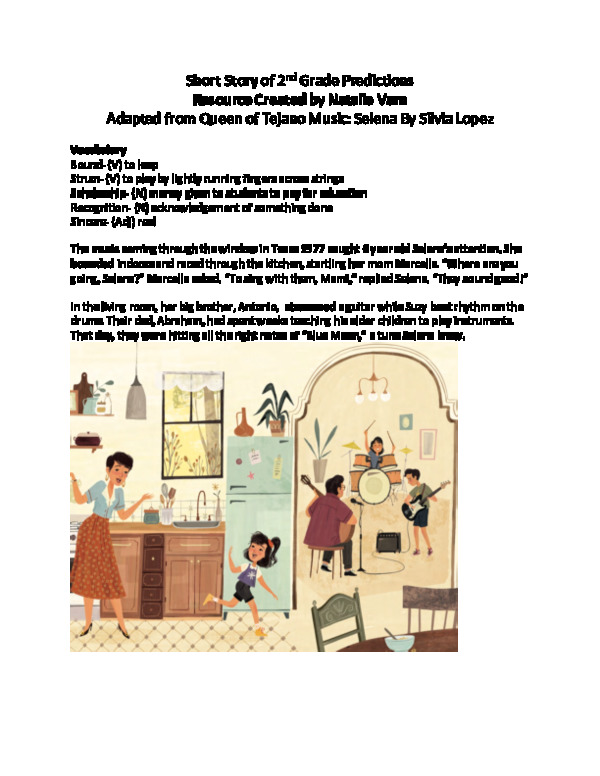Speech Therapy -> Receptive Language -> Answering Questions
Answering Questions
Responding to questions asked by another or identifying the picture/item/response that would answer the question.
Activity List(s)
Top 20 (View all)
- Reading Comprehension: Predictions for a Car Story 1
- Basic yes/no questions for school age students 2
- Kiki Celebrates Spring WH comprehension questions 2
- Thanksgiving Inference Story "Holiday to Remember" 0
- Inferencing Story (Kara Goes to a Party) 2
- WH Questions for Rosa's Playdate Story 1
- Questions about the Solar System - "Here We Are" 5
- Simple What Questions - related to self 0
- What questions related to summer 2
- Simple When Questions - related to daily life 0
- Would you rather? 2
- 15 Simple "what" and "where" questions related to Christmas 2
- Simple Where Questions - house related 1
- Halloween WH- questions 2
- Wh- Questions for Valentine's Day 1
- How Questions 0
- Simple Who Questions - related to daily life 0
- Kiki's Holiday Breakfast Discussion and Thought Starters 0
- Fall Wh- Questions 2
- Halloween Questions and Commands 2
Related Disorder(s)
- Receptive Language Disorder - A child with receptive language disorder has difficulties with understanding what is said to them. The symptoms vary between children but, generally, problems with language comprehension begin before the age of three years. Children need to understand spoken language before they can use language to express themselves.
Goal Bank
- Keiko will answer questions about classroom curriculum-relevant materials (e.g. vocabulary, concepts, passages, and story materials) using developmentally appropriate syntax and morphology with 90% accuracy across 3 consecutive therapy sessions as measured by clinician data and observation to increase language and grammatical skills. 2
- In order to improve receptive and expressive language skills, Derick will recall key facts from paragraphs presented orally by clinician with increasing complexity and length (beginning with 5-7 phonemes with progression to 5 paragraph, then 7 paragraphs, etc. as accuracy increases), with 80% accuracy across 6 consecutive sessions. 2
- Tyson will answer simple comprehension questions about short stories read out loud with 80% accuracy given a familiar visual across 5 sessions. 1
- Bev will accurately answer wh- (what/where/when/why) questions given contextual clues with 90% accuracy when given minimal cues across 5 consecutive sessions as measured by clinician data and observation to increase expressive language skills. 3
- Elisha will answer simple y/n and "wh" questions appropriately with and without visual cues with 80% accuracy across 3 consecutive sessions to improve receptive and expressive language skills. 3
- When asked a personal question/question about object/picture/curriculum, Maud will answer using a 2-4 word utterance when provided fading verbal models and visual supports with 90% accuracy across 4 consecutive sessions as measured by clinician data collection to demonstrate expressive language, receptive language, and pragmatic/social skills. 2
- Ulysses will use his/her device to answer basic what and where questions based on picture or a short story with 90% accuracy across 3 consecutive sessions to improve language comprehension. 4
- Given read aloud short stories or other language activities and minimal cues, Ilona will recall details and answer 'wh' questions (what/where/when/why) using complete and correct phoneme structure with 80% accuracy over 5 consecutive sessions to improve language comprehension and expression. 3
- Given examples of social situations, Melva will problem-solve a variety of functional scenarios(e.g. to increase orientation and safety awareness) with 90% accuracy across 3 consecutive therapy sessions. 4
- During a 4 month therapy period, Portia will use the following morphological markers, first through imitation, then spontaneously: possessive -s, auxiliary verbs, plural –s, present progressive –ing, “wh” questions (who, what, where), and negation (no, not) with 80% accuracy over 4 consecutive sessions to improve overall expressive and receptive language skills. 3
- When given verbal, visuals or gesture prompts, Teri will use 2+ words to describe a picture with 80% accuracy, over 3 consecutive sessions, as measured by observations, data collection and/or standardized testing to increase expressive language skills. 2
- Given a syllable or story, Robby will recall details and answer a variety of questions about the syllable or story with minimal visual and verbal prompting with 90% accuracy over 3 consecutive sessions to improve the receptive language skill of answering questions. 3
- Tiana will discriminate between "who", "what", "when", and "where" in order to choose the correct answer given a field of two with 90% accuracy over 3 consecutive sessions. 2
- When reading a grade-level text, Billy will recall key facts and answer comprehension questions about the text with 90% accuracy across 4 out of 4 consecutive therapy sessions to demonstrate age-appropriate listening skills in 4 sessions over 4 weeks of therapy. 2
- Harold will ask & respond to questions (e.g. yes/no, wh-, inferencing) given verbal or visual supports (e.g. pictures, stories) with 90% accuracy across 3 therapy sessions, to demonstrate fluency in types of questions answered. 3
Resources
Top 20 (View all)
-

4
-

3
-

Preschool Language Checklist
Sara Lowczyk
A quick receptive/expressive checklist for 3 and 4 year olds.
2
-

Sammy Sidekick Where Question Visuals
Jessica Lenden-Holt
Images of Sammy Sidekick in different locations that can be used for where questions. Images from Pixabay
3
-

Emotions With Lego/Block Faces, 'I Feel' Visuals
Jessica Lenden-Holt
15 pages of emotion visuals. Includes: 12 Lego/block faces with different expressions. 3 pages of emotion words (written). "Today, I feel ____" visual. "I feel" visual. Lego/block reward pages for ...
4
-

Rosa's Playdate
Lauren De Vries, MS, CCC-SLP
Short story about a plans that had to change unexpectedly!
Includes activity list1
-

Clothing Items
Jessica Lenden-Holt
A variety of clothing items for different seasons and weather, large suitcase, design your own clothing, question/command cards.
Includes activity list4
-

Halloween Speech, Language and Reinforcer Activities
Jessica Lenden-Holt
21 pages of token rewards and create a scene Halloween activities. Can be used to as reward system for correct productions/responses. Can be used to target language goals (i.e. shapes, following di...
Includes activity list6
-

Reading Comprehension: Inferencing, Space & Robots
Natalie Varn
This adapted story is geared towards targeting inferencing, story elements, and vocabulary for students who have an interest in space or robots.
4
-

Kiki and Robo Make Snow Story
Bailey Morgan, M.A., CCC-SLP
Reading Resource. Language Resource. A story about Kiki and Robo making snow. Kiki and Robo want to play outside in the snow, but then realize the snow is too icy and hard. This story pairs with th...
Includes activity list5
-

Easter Vocabulary Cariboo Cards
Sara Lowczyk
40 Cariboo cards (two sets, one with words and one without words) related to Easter vocabulary.
1
-

7
-

Reading Comprehension: Predictions For Students Interested In Music
Natalie Varn
This resource is geared towards readers at the 2nd grade level who are targeting making predictions and expanding vocabulary. The short story is an adapted version of Queen of Tejano Music: Selena ...
2
-

Sight Words Valentine’s Day Game Boards
Sara Lowczyk
6 Game Boards separated by grade sight word lists.
1
-

Calendar, Weather, Appointment Cards, Invitations, Clock and More
Jessica Lenden-Holt
23 pages of language activities targeting weather, calendar, past/present/future, clock and telling time, invitations (Wh-questions), envelope addressing, appointment cards for recalling informatio...
4
-

Winter Vocabulary/Parent Handout
Sara Lowczyk
Parent handout with vocabulary terms printed on the back.
1
-

Spring Flowers: Using Descriptive Language
Gabriella Cousino, M.S., CF-SLP
This resource, "Spring Flowers: Using Descriptive Language," was designed to be used to increase descriptive language skills. How to use the resource: Introduce flowers by name and with visuals pro...
Includes activity list3
-

YETI, SET, GO! Game Companion For Language
Breann Voytko
Use this resource to target the following Language skills: -Regular and Irregular Past Tense Verbs -Future Tense Verbs -Regular and Irregular Plurals -Object Function -Emotions -Answering WH Questions
3
-

Thanksgiving Pronoun Cariboo Cards
Sara Lowczyk
40 Cariboo cards (two sets, one with words and one without words) with Thanksgiving related pronouns. Can also be used as small flash cards for other activities.
1
-

Getting a Haircut Autism Visual Support
Sara Lowczyk
A haircut picture schedule made while I worked at The Autism Program.
1